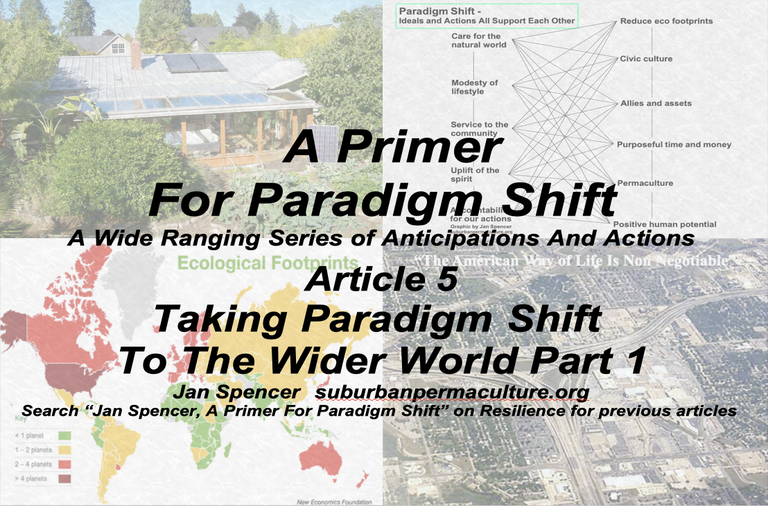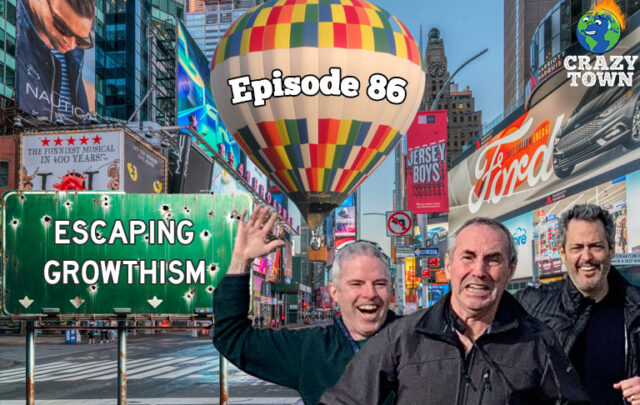This article is part of the Primer For Paradigm Shift Series and will describe taking the ideals and actions of paradigm shift to a wider audience. We have many allies and assets to work with for sharing what paradigm shift has to offer the wider world.
This article will be in two parts. Both parts are worthy of a book. Taking these ambitious sustainability ideas out to a wider audience is vital to paradigm shift, our place in history and it’s fascinating as well. In a nut shell, we have the reasons, the opportunity along with the allies and assets to work with, for a great leap forward in human social evolution and our relationship with the natural world.
If early Homo sapiens, a hundred thousand years ago, could find their way from Africa to Europe, Asia, Australia, North and South America, today’s Homo sapiens can find our way to uplift and sustainability. We will either make the needed changes or wish we had.
Part one will start with a look at shared values, goals and ideals, then a permaculture concept “make use of the edge.” We will have a look at this edge of history. Next, “be the change,” how we can assist paradigm shift starting with the choices and actions we can make in our own lives. And then, a look at how public interest organizations large and small can energize each other when they realize a common cause and are all on the same team. We have an enormous slumbering movement that we can help wake up.
How might the American Association of Retired Persons [AARP], The Sierra Club, Occupy Wall Street and many others make common cause with each other, becoming a much larger, stronger and broad based, but still horizontal movement and advocate paradigm shift to their members and the wider world.
Part two, in another month, will focus on faith groups, Labor and inviting capitalism to Truth and Reconciliation. Faith groups and Labor have many powerful assets to help take paradigm shift to a wider audience. Then, an unusual idea, inviting capitalism to a public Truth and Reconciliation process. Such a process can become an enormous educational and empowering tool for paradigm shift. The owners and enablers of capitalism can benefit as well.
First, a quick explanation of paradigm shift. The writer is an optimist, but can see no easy exit from the seductions of the consumer culture and its steepening social and environmental damage. Capitalism and its cult of growth, vanity and overconsumption is not compatible with a healthy natural world and social uplift.
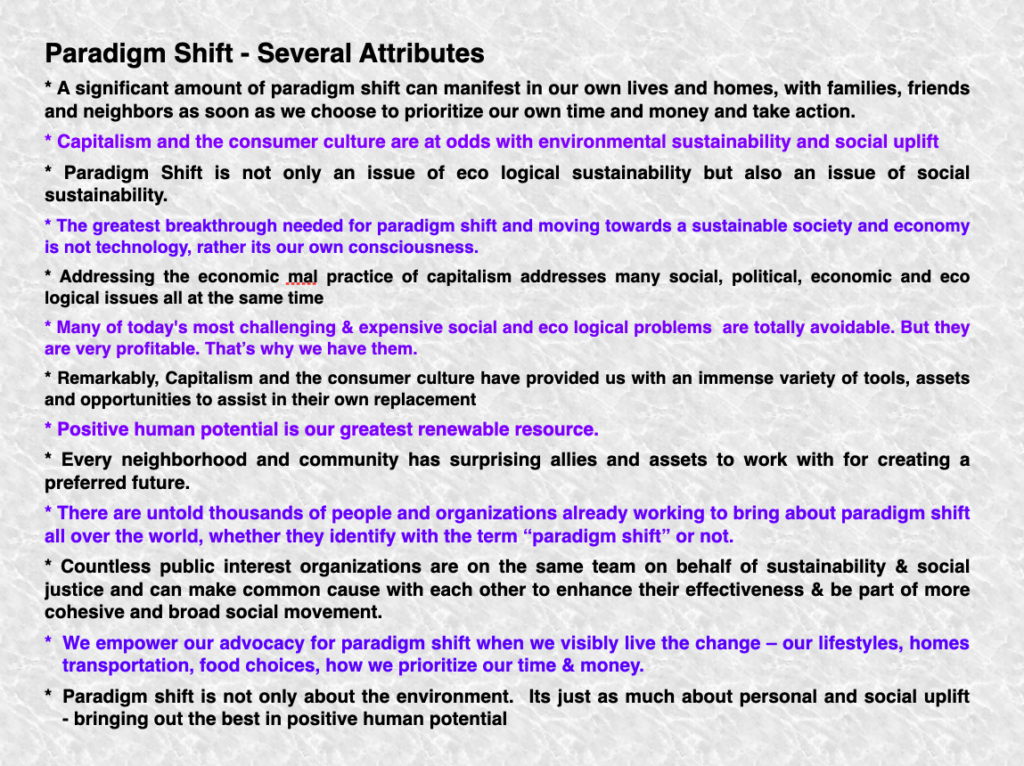
Paradigm shift is a movement towards a society where humans thrive within the boundaries of the natural world, one of society’s primary goals is to bring out the best in positive human potential and this uplifting society is served by an honest and accountable economic system.
Social, economic and environmental disruption directly related to over consumption are already causing problems for increasing numbers of people all over the world and even in the affluent countries. The chances for reaching a sustainable future are better if we make purposeful choices, sooner than later, as individuals and society, to reduce our eco-footprints and build sustainable civic culture. Downsizing in the not so distant future may be not so graceful or voluntary
What is an appropriate level of downsizing? Good question. We can be certain, a sustainable lifestyle would be very different for everyone, the more wealthy, the bigger the change. Refer to the primer article “What Might A Sustainable Lifestyle Look Like?” A number of sources suggest the expansive eco-footprint of the average American needs to be a fifth of what it is now. Even half would be a massive shock.
Such a condition is hard to contemplate. Imagine using one fifth the resources and energy you do now. Transportation, shelter, food choices, recreation.
That doesn’t mean we have 1/5 the food, comfort or security. With care and creativity, a sustainable society would offer many benefits over what we have now. A sustainable future calls for a leap forward in consciousness rather than a “breakthrough” in new technology. Ironically, some of the hoped for breakthrough technologies would make many current problems even worse.
Today’s problems will not be solved by the same business model and profit motives that have caused them. Sustainability calls for technology that serves people and planet rather than profits for wealthy investors.
The ideals and aspirations of paradigm shift may look distant and hard to imagine at present but as existing social, economic and environmental trends deepen, paradigm shift will gain traction even within the mainstream. Its positive outcomes limited only by our own imaginations and actions. Positive human potential is our greatest renewable recourse.
Previous Articles in the Series
Other articles in this series about paradigm shift include a deconstruction of the myths of capitalism, an explanation of external costs and the need to reduce our eco-footprints.
We also looked at aspects of paradigm shift such downsizing, how we prioritize our time and money, the double benefit, re-sensitizing, allies and assets and more. Two other articles focus on 24 years of permaculture applied to a suburban property and transforming a run-down drug infested-apartment complex into a thriving eco-village.
Still other articles are in the pipeline such as what familiar products and services of today’s affluence will not likely make the cut to sustainability?
To A Wider Audience
Importantly, we have many latent allies and assets to work with for paradigm shift and many people and groups are already creating alternatives to the consumer culture. Their stories point the way towards sustainability and a preferred present and future.
Thousands of public interest organizations are already on the same paradigm shift team, even if they don’t realize it. One of the most important goals of paradigm shift in the early going is to show both to the wider world and these organizations why they are on the same team and how they can work in common cause with each other for the benefit of people and planet.
Working in common cause, these public interest organizations can become a more effective and wide ranging horizontal movement. Organizations and groups continue with their own niche of interest but can coordinate with others and are fortified knowing they are part of a larger historical project.
With luck, the paradigm shift movement might even gain access to the political realm. There are many important parts of paradigm shift already at work. This article and series go into more detail.
Shared Principles, Values and Ideals
A vital part of bringing a movement together is a shared vision and set of values that is uplifting, effective and practical. Words don’t amount to much without action. Shared values and goals can make the work of social, ecological and economic transformation productive, even fun, and can attract others to join in. Downsizing lifestyles and making time to build a civic culture of common cause addresses a wide range of social, economic and environmental problems, all at the same time.
Paradigm shift can draw its inspiration and practical ideals from many sources, including books, articles such as EF Schumacher, Your Money Or Your Life, Richard Heinberg, Human Scale, Naomi Klein, Club of Rome and many others.
Two sources of foundational paradigm shift inspiration for this writer are permaculture and the wisdom of the world’s great spiritual traditions. These ideals are simple and can be applied in diverse realms ranging from food production, urban land use, economics, transportation, housing, public health and more. These ideals can work at scale from a personal lifestyle, to home, street, neighborhood, community and beyond.
Permaculture is a holistic set of principles and values that can be used to design systems for taking care of human needs in ways that are friendly to people and planet. Several of permaculture’s most important ideals are to work with natural systems, create no waste, value renewable resources and use small and slow solutions. Permaculture advocates for people care, earth care and fair share.
The wisdom of the world’s great spiritual traditions is the product of millennia of human experience. Its content source is diverse in geography, history and culture. This wisdom includes care for the natural world, uplift of the spirit, simplicity of lifestyle, service to the community and accountability for our actions.
This wisdom is about human behavior in the personal and social realms and our care for the natural world. This wisdom is not about religion and is a perfect fit with permaculture and sustainability.
Permaculture ideals and principles and the wisdom of the world’s great spiritual traditions can be used to create systems to move past capitalism. The outcomes for applying these values, ideals and goals to our economic system and society can help mitigate climate change, social and economic disequity and many issues of public well being. Note, important we say mitigate, to reduce, not make go away.
Also important to know, there are many examples of paradigm shift that already exist. Other articles in the Primer series describe transforming suburbia, urban eco-villages, empowering young people, investing local and much more.
Many of the most challenging social, economic and environmental problems of our time are completely avoidable. Capitalism is not broken, what we see is just what it does. The outcomes of capitalism will be like a knuckle ball.
The systemic problems of our time already presenting themselves are dynamic. We will be trying to adjust to a moving target over the coming decades and generations. We don’t know exactly how these changes will present themselves. Something like going to a restaurant and knowing there is food but not knowing exactly what’s on the menu.
Best to learn flexible skills that can apply to a variety of conditions. We can help prepare ourselves as part of paradigm shift. Even seriously downsizing we will not likely prevent the problems already arriving from becoming worse but we can start the process to be adaptable. Downsizing and being resourceful will help a lot. Our purposeful skill building can help us adjust to a variety of changeable social, economic and environmental conditions. History invites humanity to a big leap forward in its capacity to thrive in an uncertain future.
An Historical Edge
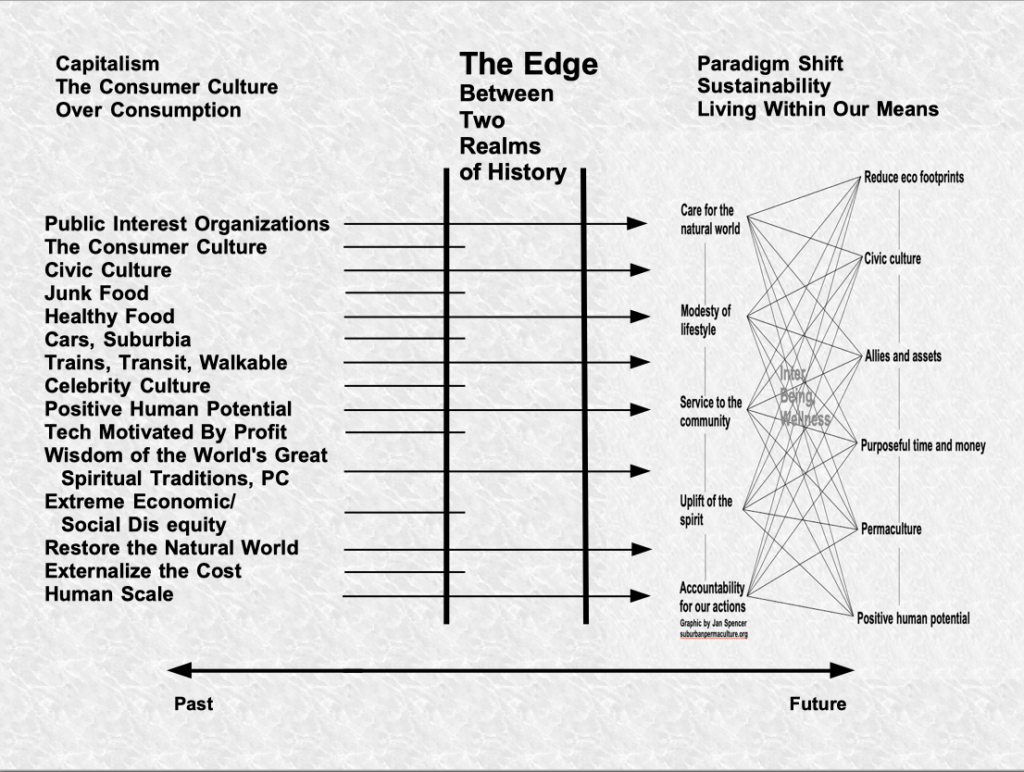
Another important principle of permaculture is the edge. The edge is a place where two different systems come together. Perhaps wet and dry or sun and shade. We are living at an historical edge. On one side – capitalism, vanity, overconsumption. On the other side – paradigm shift, uplift and sustainability.
Capitalism, economic growth and its consumer culture have dominated generations of American culture and lifestyle. The assent of the American Dream became steep after WW II when war time industry shifted to domestic production and modern advertising became more adept at wide scale social engineering, also known as advertising. Cars, suburbia and the upwardly mobile lifestyle, more stuff became the American Dream.
The rise of the middle class delivered comfort, convenience and for many, unprecedented affluence. Living standards rose for many millions although access to the American Dream was not universal. During the second half of the 20th century and into the 21st, there have been business downturns, domestic upheaval and various international disruptions but still, the comfort and convenience of the vast number of Americans has improved remarkably over the past 100 years.
But the historical sidebar to that American Dream is a leading participant in the increasing level of damage to the natural world, economic malpractice and a distracted/disempowered civic culture. Water and air pollution, ozone depletion, soil erosion, habitat loss, human produced chemicals in the environment and much more all became the visible damage of the rise of the consumer culture. In more recent decades climate change, a product of overconsumption, has become a household word.
Access to the middle class has not been equal. America’s history must recognize the terrible mistreatment of indigenous people and racial discrimination. There have been many human casualties to this sidebar of history. Race riots, Vietnam, the Counter Culture of the 60’s and more clearly showed the American Dream was not universal, and for some, the super consuming American Dream was not wanted in the first place.
This sidebar of history also includes economic developments such as globalization, many examples of corporate wrong doing and bailouts, the decline of traditional blue collar jobs and security, the concentration of economic wealth, troubling questions and consequences of technology; political fragmentation and disfunction, even within the mainstream itself. These and many other related and well documented trends and conditions have led to new and widening criticisms of capitalism and its most important servant, the political system.
While the economic system has appeared to take on some of the rhetoric and concerns of its critics, particularly in regard to climate change and ecological trends, it has proven it is not capable of a meaningful change in its behavior when the paradigm of profits and growth are called into question.
Several politicians have been quoted as declaring “the American Way of Life is non negotiable.” This remarkably arrogant statement tells us there is no alternative to the pursuit of affluence and overconsumption. This statement tells us those who disagree are hostage to a System they don’t want.
This statement tells us how determined and inflexible the keepers of capitalism are to maintain control of the nation’s politics, policy, culture, education and global relations. Profits and excess are more important than social uplift and sustainability to the owners and caretakers of the System.
The overall management of the economic system remains the same. Some tweaks have been made that are good for public relations but, essentially, the System keeps doing the same thing while it thrives on damage to people and planet. Millions of jobs exist to repair the damage caused by millions of other jobs.
Meanwhile, there have always been idealists and visionaries calling for utopia. The fact is, we do not need utopia. We need a society that shakes off the dumbing down distractions of the consumer culture. Paradigm shift, from this perspective, is not about utopia, it’s about common sense and people acting in their own, even selfish, best interests. Those selfish best self interests also include deep care for others and the natural world.
So we are at an historical edge. A small but growing number of people are already looking beyond capitalism and its consumer culture. One can find a growing number of books and articles critical of the current System of government, economics and society based on overconsumption of energy and resources. Take note, permaculture is becoming a new global language.
Sustainability and social uplift do not need a technical breakthrough. Paradigm shift can succeed with enough people making breakthroughs in their own consciousness. This series of articles, along with similar thoughts from many others, is intended to encourage and activate that shift in consciousness.
This is the edge where two historical systems come together. Capitalism has delivered much to be grateful for but is not capable of serving the next chapter of human history, to live within the boundaries of the natural world and to do that, we need an unprecedented shift in consciousness in regard to ourselves, our neighbors, our place in history and our relationship with the natural world.
Fusion energy too cheap to meter and artificial intelligence will not serve the next chapter in humanity’s history if we want uplift of the spirit for the good of self, people and planet.
Capitalism absolutely offers many useful products and services that can be an immense assist to paradigm shift. Communications and sharing ideas is one of the best. Paradigm shift will not likely happen with snail mail or the telephone. We need technology but technology that serves a healthy purpose.
Who decides what is healthy? Our best hope is a widespread uplift of society’s consciousness. We already see interest in the mainstream that could evolve towards paradigm shift. Some of that we call greenwash but greenwash may be the early going of widespread and functional change in consciousness.
Healthy food is a a issue, pushing back on cars is another. Alarm about social and economic disequity, questioning suburbia and unbridled technology all indicate an increasing level of questioning the System. Add social influencers advocating “soft living,” that is, live your simple lifestyle dreams rather than the American Dream of ever more stuff. Even better when those influencers understand paradigm shift and can explain to their followers how their soft living ideals and lifestyles can evolve to fit well with paradigm shift.
Changing social, environmental and economic conditions at the edge will absolutely present new opportunities for creative and positive use of familiar social, built and economic structures and even our own selves. A transformation towards a sustainable present and future will require reimagining and repurposing the familiar with outcomes guided by uplifted ideals, values and vision.
Be The Change
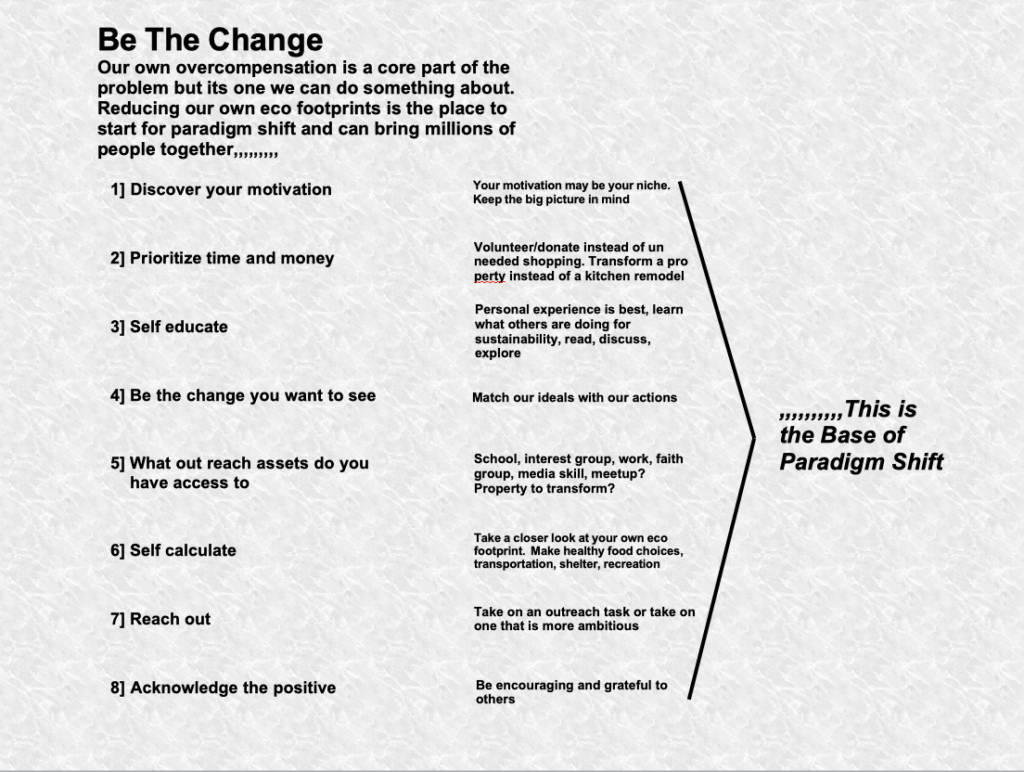
Taking the ideas of paradigm shift out to a wider audience is an enormous task and we have many allies and assets to work with. People taking the time in their own lives to be a part of a movement towards sustainability and uplift is essential. A successful movement is better served by many people participating with a shared message and vision rather than a few leaders. One can create their own niche as part of the paradigm shift movement.
Becoming a paradigm shift advocate is self generated. Here are several useful basics ideas and we will explore them a bit deeper shortly. Consider this a primer within a primer.
1] Motivation, the need to activate, find a niche
2] Prioritize time and money
3] Self educate, personal experience is best
4] Be the change you want to see
5] Self calculate, take a closer look at your own eco-footprint
6] What kinds of out reach assets do you have access to
7] Be prepared with your outreach
8] Acknowledge the positive
What can motivate us to activate? What motivates you might be your niche. The need for paradigm shift is broad and deep to say the least. This society has a lot of problems and there is a welcome for everyone to help out. The problems are social, spiritual, economic, environmental. We are most effective with measured passion. At the same time, it’s important to know, and be able to articulate, where your niche fits into the larger picture.
The writer for this primer has a keen interest in deconstructing the myths of capitalism, aspects of paradigm shift and what can paradigm shift look like in real life. This content is applicable to many advocacy needs and is available for use by anyone and anyone can add to it. Search online, both written and Youtube. “Jan Spencer paradigm shift.”
A focus on affordable housing or climate change can still use the critique of capitalism, aspects of paradigm shift and what might an eco-friendly lifestyle look like.
Activating and advocating depends on people taking the time for putting useful information out to the wider world. An important term used in the primer is “prioritize time and money.” The consumer culture provides many distractions and they are very successful in disempowering peoples’ capacity to act in their own best interests.
What distractions are we willing to exchange for our own self-empowerment thru outreach? Another angle on self-empowerment is liberation. Self-empowering is the same as self-liberation and discovering and developing our own potentials and power and what better cause than being an active part of social uplift and restoring a healthy natural world?
What we choose to do with our own time will tell us a lot about our own selves. Can we match our ideals with our actions?
Making time available is a self-affirming process. It is very much the start of pushing back against the very interests of excess and vanity that would like us all to be docile and passive consumers and make the rich and powerful even more rich and powerful at the price or our own uplift and the well being of the natural world.
We can enjoy many aspects of paradigm shift in our own lives as soon as we care to. No need to wait. The more people engaged in paradigm shift, the greater the benefits for everyone.
Self-educate. Find out more about your niche and you will expand and deepen your advocacy. There are books, articles, search on line, connect with others, contemplate. See if you have a “Meetup” group with these kinds of interests where you live. Search “permaculture” where you live and connect with others with similar interests. Everyone can share what they are learning from each other.
I find fascinating information reading the New York Times and other mainstream sources of info that relate to paradigm shift because I am tuned into paradigm shift. For example, one article explains the benefits of subsidized affordable housing in Paris, the other, how the Bruderhof Society deals with technology and their avowed simple living social ideals.
Both articles describe real life approaches to address housing and technology issues. The spark of insight and putting what we learn into a broader context is a great satisfaction and even better when that insight has practical application on behalf of a preferred future.
Being the change. Few impressions are stronger than seeing someone or group being the change they advocate. Words are useful but actually making the changes is far stronger. Downsizing a lifestyle doesn’t mean living in poverty but it does mean making changes that friends will be curious about. Saying no thanks to the game or shopping spree in favor of self-educating for making a presentation or volunteering for a good cause is a big move forward in managing our own time and being the change.
Being the change can be fun. Work parties near my house at the Filbert Grove or Rasor Park attract 8 or 10 people and sometimes more. It’s fun to meet others while doing something useful and have conversations about whatever people like to talk about. Today’s work parties also give us experience making us more ready for a time when work parties will need to be more serious.
One year our neighborhood hosted the Northwest Permaculture Convergence at our neighborhood rec center. The Convergence is the largest permaculture event of the year in the Northwest. Essentially, we created a paradigm shift university for the weekend. Presentations, breakouts, bike site tours, plenary sessions, out door expo, play time. We estimate 700 people participated. Remembering the event still delivers a buzz. It was a suburban permaculture convergence that invited the wider world. Hosting the Convergence was the idea of a single person that also empowered, uplifted and educated hundreds of others.
Few of us own a TV station but we still have access to ways of sharing the ideas about a preferred future. If one is new to activism, maybe take on a modest task like a letter to the editor on a topic you are interested in. One might comment on an article like the New York Times on line where space is available for people to share their thoughts. Make a sign for your bike to express why biking is good for people and planet.
All kinds of curriculum for students in college or high school can link to paradigm shift. Sociology, regional planning, law, business, geography, political science. Writing a research paper about paradigm shift could apply to many classes. One can share preferred future ideas with others like a study group, an online forum, a church social concerns committee or a break at work.
If one is a property owner, one’s own property can be a highly visible place to put paradigm shift ideas out to a wider audience. At the same time, transforming a property offers many benefits.
1] It can help build one’s own resilience and personal health.
2] It can be a model for others, a story in the media, Youtube, blog, etc
3] It can be a place to show and tell others what suburbia can look like
My own quarter acre suburban property is a great example of what suburbia can become with paradigm shift. It’s a powerful example of how a modest home with a substantial amount of self-installed permaculture upgrades can be a safe, comfortable affordable place for 4 people to live, myself included. Thousands of people have visited over the years and many have put what they learned from the visit to my place to good use. I know because many people who have visited my place have told me what they did to their own property after seeing my place.
Another article in the Primer series describes my place and comparatively small eco-footprint lifestyle
Self-Calculate. One can self-educate about one’s own lifestyle, by answering the questions of the “footprint calculator.” The lifestyle questions probe one’s housing, spending money, food choices, transportation and more. All these questions point to behavior we can change in our own lives to actually reduce our eco-footprints. That first hand experience gives credibility to our advocacy. What you describe to others can help them move towards sustainability such as explaining how you became vegetarian or vegan or started riding a bike.
The calculator can be a great topic for conversations. One might even create or join a mutual assistance group to support each other cutting down on overconsumption. You can find the calculator at footprintcalculator.org from the Global Footprint Network.
Be nice. Simply just being friendly, helpful and courteous to others is a huge part of paradigm shift. Making the time to be nice. Offering personal encouragement is great way to raise the vibe towards a more peaceful and healthy world. Just telling someone thanks for something positive they did reinforces healthy social behavior. Who knows what benefits kind words can lead to.
I had a very nice short chat at the big box check out last week. Turns out the young lady at the register was also into gardens. We ping ponged a bit about growing food and agreed gardens are awesome and ended our chat with a friendly fist bump. A nice social buzz for both of us.
People who have written books that have had impact on many people started somewhere. It’s up to us to determine how much of an advocate we want to be but there is room for everyone. One should not expect too much thanks for making personal changes or being an advocate. We need to activate, reach out and be positive simply because it’s the best thing we can do both in the moment and long term. It’s good for one’s own well being as well.
The more people making the time, being openly positive, being the change, having coherent and usable ideas to share, reaching out in whatever ways we can, the better. Maybe even pushing oneself to try something new. Paradigm shift depends on people making best use of this edge in history along with their own time and money.
One of the greatest resources we have is to communicate, learn, explore, activate, encourage each other and grow this movement. The better world most people want will not happen by itself. There are lots of distractions but there are many friends to make and many allies and assets to work with.
Interest Groups
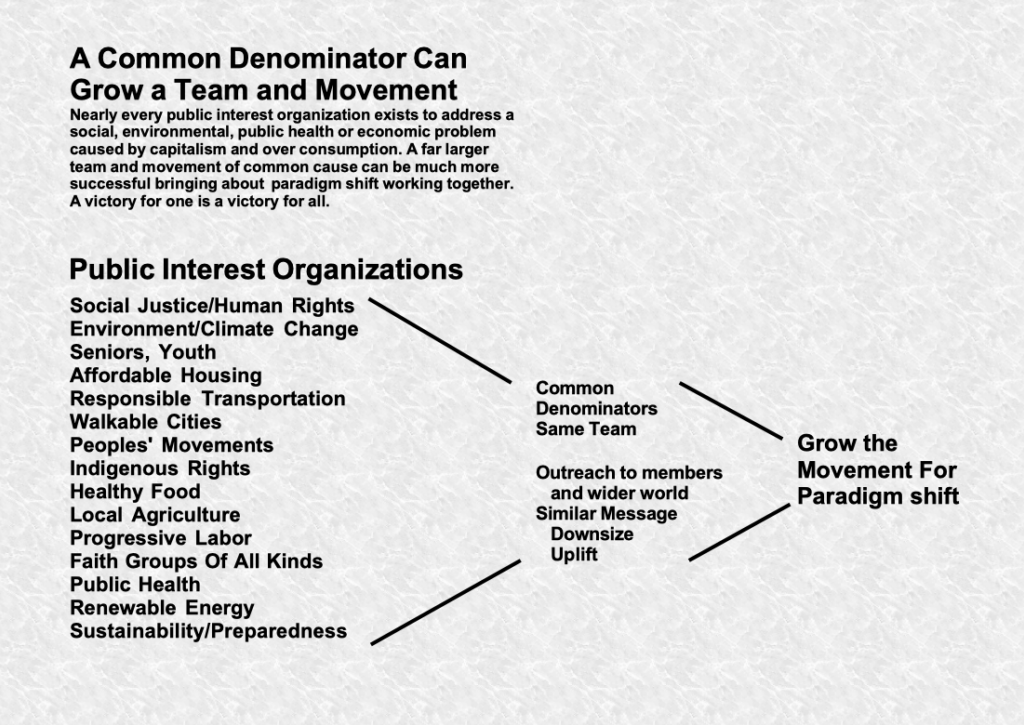
Let’s have a look at several interest groups and other items of interest that have built-in assets for engaging in paradigm shift and sharing those ideals with the wider world, even if changing the world is not a part of their original agenda. Some of these opinions and observations may be difficult to imagine. Yes they are, but that doesn’t mean they don’t make sense. Our imaginations are limited by our expectations. Our actions are limited by our imaginations. The idea and attraction for paradigm shift will only increase with time.
Colleges and Universities
Colleges and universities can be a powerful force for needed changes. Many faculty are very sympathetic, some even research and write about the problems facing society. Universities typically have student groups based on all kinds of topics and issues, many are social, economic and environmental. Higher education has many topical interests and realms of study that link to making society a better place.
Faculty, administration and students can all initiate more ambitious links between existing interests and paradigm shift.
Here in Eugene, the University of Oregon’s Public Interest Environmental Law Conference, organized by students at the law school, has been a fixture for dozens of years. All manner of environmental issues have been discussed in presentations and panels such as habitat loss, water, aerial herbicide spraying, climate change, species at risk, peak oil and much more The writer of this article has participated many times in the past as a presenter.
Most of the topics discussed and presented relate to damage to people and planet. Organizers could easily add the element of paradigm shift to the conference agenda and even make the conference more overtly about sustainability and moving past capitalism. The conference already has a strong activist tradition. Pushing that envelope to include paradigm shift is a natural progression. Just a few organizers could catalyze a major shift in the character of the event to include much more paradigm shift content.
As part of a larger social movement for paradigm shift, academia could make available its research capacity to other movement members. That relationship could also give academia access to new realms of study and collaboration. Faculty could encourage students to look into paradigm shift and include more sustainability material in existing course work.
Neighborhood Programs
Many cities have neighborhood programs. That means the city has professional staff with the task to help the city’s neighborhood associations [NAs] make their neighborhoods better places to live. Typical issues include development, crime, homelessness, the environment, transportation, building civic culture and more. Most NAs have monthly meetings, an executive board and action groups based on interests such as human rights, the environment, public safety and more. Monthly meetings usually have a program of interest to the neighborhood.
NAs have standing in the community. They communicate with the wider world via snail mail and internet. Many use Zoom for enhanced outreach. NAs can can become more ambitious with their agendas. Like so many other organizations, many of the issues they engage in, mentioned above, are often damaging consequences of the economic system.
Those who participate help set the agenda. We had a program in February this writer organized with the title “Gardens Deliver More Than Veggies.” The program started with a look at the permaculture history of our neighborhood. Many people attending did not know about permaculture or its activist history in our neighborhood.
The program was mostly about sociology, explaining how gardens can bring people together in common cause over food production. Gardens are great for disaster preparedness, reducing eco-footprints, producing important needs closer to home, boosting “home economics” and building community. We had a follow up with a site tour of my suburban permaculture property that drew over 35 people. The message for the tour was all about transforming suburbia and paradigm shift and how gardens can help build community and catalyze paradigm shift.
Our NA organized a big River Fest in the car free Willamette Greenway last September with many neighborhood organizations tabling, there was a bike safety check up, a crowded cider press with people bringing their own apples. There was an acoustic song circle with 40 people, Master Gardeners, shared gardening information, there was fresh water biology for kids, a big permaculture display, take it or leave it table to trade garden produce and much more. Many who attended were aware this was an event that showed much of what life could be like moving towards sustainability.
NAs are well placed to take the ideas of paradigm shift to a wider audience, even if that message is subtle such as the program I organized described above. My involvement with RRCO, our NA, has been one of the most enriching community experiences of my life.
National Climate Corps
This quote is from Joe Biden’s Whitehouse website. “The American Climate Corps will put a new generation of Americans to work conserving our lands and waters, bolstering community resilience, advancing environmental justice, deploying clean energy, implementing energy efficient technologies, and tackling climate change.”
This all looks good. But does this rhetoric go far enough? The writer is all for community and national service such as the Scouts and Americorps. Youth should absolutely learn the value of responsibility and taking action to address real problems. The Climate Corps should also be accessible to older people, too.
The concern here is, do the Climate Corp participants expect their goal or purpose is to make green our familiar consumer culture? Will the participants be co-opted into green wash? Certainly, participants who do have an interest in sustainability and paradigm shift can share their thoughts with co-workers and the local administration of Climate Corps. Whether part of the official program or not, those involved with Climate Corps have the opportunity to connect it with a progressive perspective on sustainability and the consumer culture.
My hope is the Climate Corps includes permaculture, ideals and actions that do fit paradigm shift. Plan B would be to add those approaches as needed. There is enormous positive potential for the Climate Corps.
Modest Assets and Tough Challenges
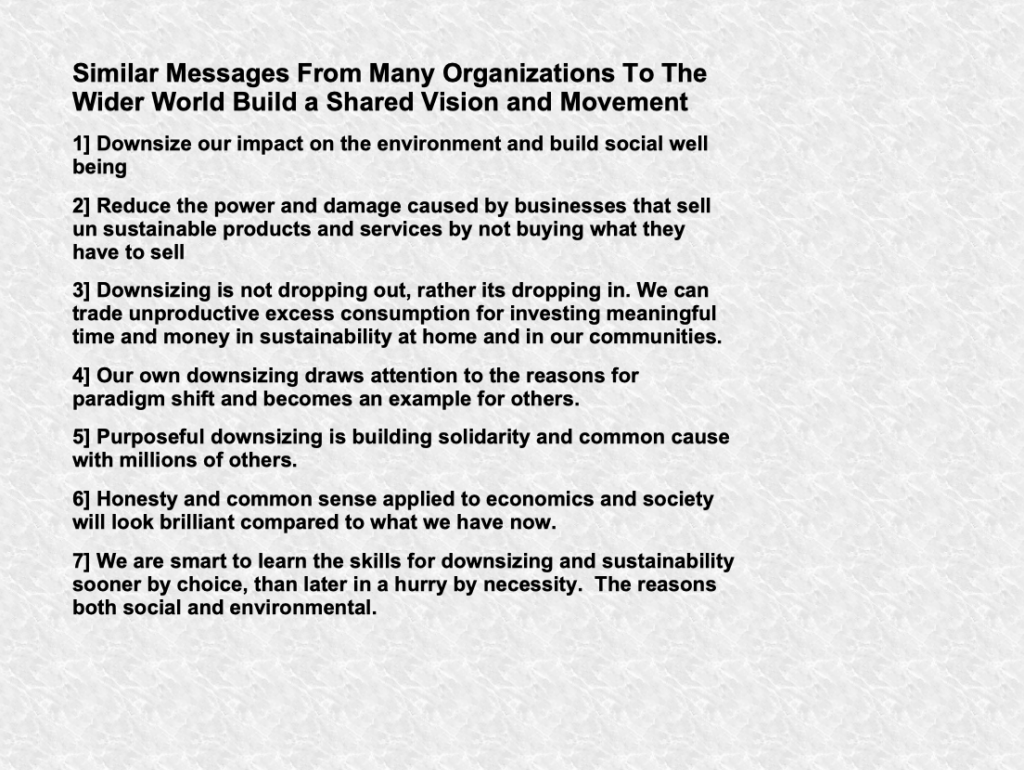
An increasing number of articles from the mainstream media [The New York Times, CNN, The Guardian, Newsweek] describe more people struggling to keep up with paying for car expenses or finding affordable housing. Also, fewer members of the younger generations will be able to afford a home of their own while more adults are living with their parents. Also, recall the growing interest in soft lifestyles.
The American Dream is fading for some while others are saying no thanks by choice. This downsizing demographic can be a powerful force and perfect fit for paradigm shift. Welcome to the future.
People can use their downsizing in a positive way. As described above, we all need to reduce our eco-footprints and that process may be difficult. There is no magic to make those lifestyle change problems go away but recall the discussion above “be the change.” Downsizing may be far more manageable when the experience is shared with others. Just knowing we are not alone can be helpful. Downsizing can be leads to new friends, allies and networks.
Recall from above, what access do we already have or what new ways can we find to connect with others with similar conditions and needs? Paradigm shift calls for working with others in common cause for mutual benefit. Intentional downsized living can address our own personal needs, the well-being of the natural world and serve the cause of paradigm shift all at the same time. Finding that shared common cause with others may be a challenge but the benefits can be enormous. Could be a person new to all of this sustainability stuff, takes initiative, discovers, learns, self-empowers, reaches out and becomes an important “how to” resource for others.
Kailash Eco Village in Portland, Oregon is an inspiring example of purposeful creativity in regard to satisfying the needs of people with modest income and could be applied to many others downsizing by choice or not.
Kailash receives a lot of attention in another part of the Primer series but it fits well here, too. The eco-village [kailashecovillage.org] was a run-down, drug-infested 35 unit apartment complex. Over the past 17 years, the owners and residents have created a thriving eco-village from that trashed out site.
Kailash is a rental and affordable. In effect, the eco-village has empowered some 50 people of modest means to help restore urban infrastructure, reduce their eco-footprints, learn valuable social skills for civic engagement and reach out to the wider neighborhood. To be clear, Kailash is not a legal co-op, it’s not co-housing, it is privately owned.
There are gardens, shared spaces, bike facility, compost, car share, depaving, outreach to the neighborhood, public art, emergency preparedness. There are many working committees at Kailash that make it all happen. Some residents have moved on and started smaller versions of Kailash elsewhere.
And then a year ago, the owners mortgaged Kailash to buy the larger apartment complex next door that was also run down. As of early 2024, ”Annapurna” is in the early going of its own transformation from trashed out apartment complex to eco-village.
There must be thousands of run-down apartment complexes all over the country. They are an enormous opportunity to take paradigm shift to a wider audience. They are an enormous opportunity to provide affordable housing to people who want to downsize by choice and for people who need to downsize because of circumstance. One could think of it as a “missing middle” of downsizing.
Imagine if labor unions, faith groups, affordable housing non-profits, organizations of different kinds, businesses and other entities borrowed a chapter from the Kailash play book and took on the repair of run-down apartment complexes, perhaps for their own members or as a project for the public coordinated with local or state governments.
Another idea for repairing apartment complexes would be a government make work program similar to the CCC during the Depression. The focus of this modern program would be to repair damaged apartment complexes. People needing work would receive training in the skills needed to repair the complexes. Some might even end up living at the complex they helped restore.
Imagine people downsizing by choice or not by choice making common cause to combine resources and instead of isolation, create a place with others to live that serves their needs.
The transition towards an uplifted future already offers enormous challenges and wonderful new possibilities. Run-down apartments turned into eco-villages could serve the healthy needs for hundreds of thousands of people. This edge of history calls on us to reimagine our own problem solving potentials and at the same time, encourage larger organizations to expand their thinking about how they can use their administrative and financial assets for the common good. Turning run-down apartments into eco-villages covers a lot of bases.
Gross National Product
GNP is a term most of us grew up with. Updating our thinking about measuring the health of society can benefit paradigm shift. GNP is a statistic that measures the growth of economic activity in a country over time and defines this narrow, and shall we say, self-serving view of reality as progress. GNP is a crude measure, it simply adds up how much production, buying and selling takes place in the country.
For this outdated thinking, the larger and faster the GNP the better. GNP has served as a propaganda tool for economic growth. It does not consider that some economic activity is healthy and some is not. The GNP consider a funeral from a car wreck or the sale of junk food or tobacco to be positive.
GDP ignores other important conditions of society. That makes identifying and correcting problems more difficult while GNP serves the agenda of the owners of business to increase their wealth and political power.
GDP was and is still used to inform policy and for many, is still the primary standard of economic progress.
In a critique of GNP, former French president Nicolas Sarkozy observed we will not change our economic snd social behavior “unless we change the ways we measure our economic performance”.
GNP does not account for non-paid work, damage to the natural world, services provided by nature, climate change, external costs, social well being, literacy, economic disequity, the decline of wages for many sectors of workers and more.
In recent years, other types of indicators have become available to address this GNP problem measuring conditions that tell a much more accurate story about society’s successes and challenges such as education, life expectancy, health care, life satisfaction, work and life balance, ecological conditions. New indicators include the Human Development Index, Better Life Index and Genuine Progress Indicator.
A set of indicators that tells a much more holistic story of a society’s problems and positives provides the public with a much better understanding about society’s condition. A deeper understanding of the country’s condition can help educate and motivate the public to make our lives, communities and nature a better place. Paradigm shift can only benefit.
Public Interest Organizations
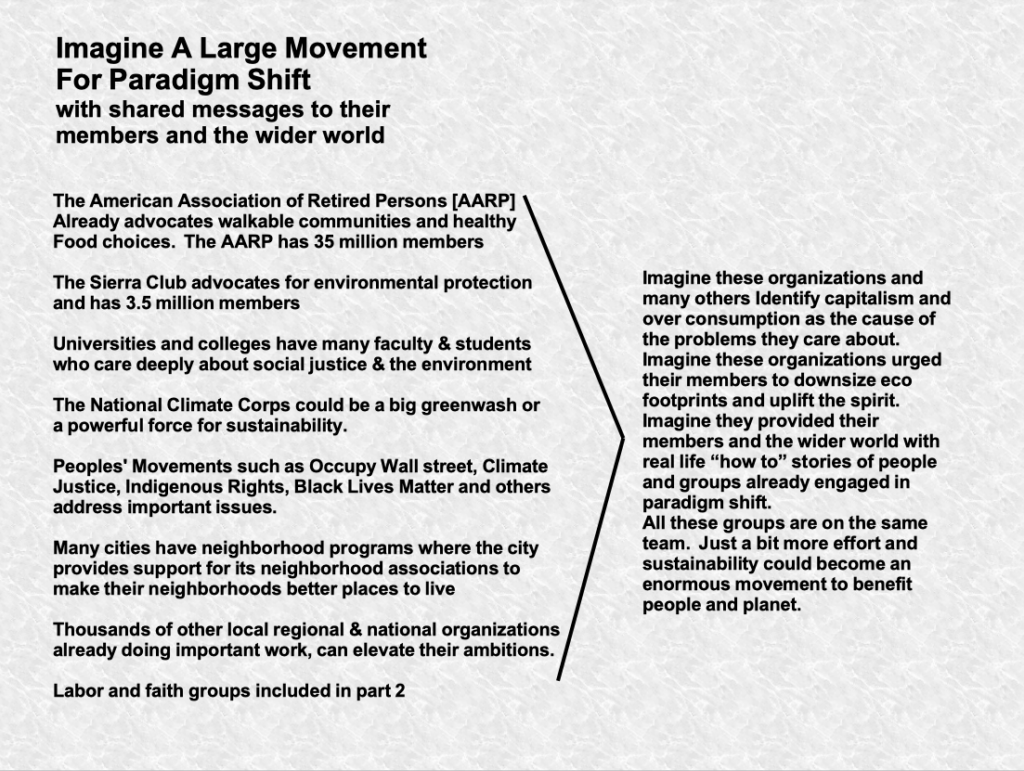
There are many thousands of public interest organizations all over the country. A public interest organization exists to help make our lives better. Typically, they have a focus such as social justice, the environment, affordable housing, public health, children and much more. Large horizontal movements such as Black Lives Matter, climate justice, Occupy Wall Street, Indigenous Rights are also public interest groups.
Some PIOs have a dozen members, some have millions of members. Some are local, some are national. Some have professional staff with budgets into the millions, some are ad hoc and totally volunteer.
PIOs have educational and outreach assets. They have faithful members, they might work with other organizations, community leaders, elected officials, faith and business people.
Almost all these organizations exist to mitigate some kind of social, economic, justice or ecological damage caused by capitalism and overconsumption. [Note: Part 1 of the Primer features a detailed critique of capitalism.] That means virtually all these organizations and movements have a common denominator for their issues and that means they are on the same team. A thoughtful push back on capitalism by one group benefits all of them. Working together can empower all the groups to greater success.
Imagine thousands of public interest organizations explaining to their members why downsizing their eco-footprints will benefit their own lives, the broader society, the planet and the concerns that particular organization cares about.
And imagine if those organizations explain to their members that many other organizations also encourage their members to reduce eco-footprints and even further, pointing out, “we are all on the same team.” Understanding there is a collective identity and purpose builds a sense of a cooperative movement and momentum.
These organizations could lift information from this Primer and other kindred sources of content and share it with their members. They could include articles in magazines and newsletters describing permaculture and “how to” content for downsizing and they could profile people and groups making these changes. [Note, see several other parts to the Primer, “Transforming A Suburban Property,” “Real Life Examples of Paradigm Shift,” and “Kailash Eco Village.”]
If calling for full on paradigm shift or the replacement of capitalism is language a bit too strong, these actions could be explained and encouraged in terms that fit the need.
The common message all these groups can share with their members and the wider world is that we can trade overconsumption and consumer culture distractions for many personal, family, community, ecological and even spiritual benefits all at the same time. Here are points to make groups can share with their members and the wider world. Each point can be expanded on.
1] Reduce our impact on the environment and build social well being
2] Reduce the power and damage caused by businesses that sell unsustainable products and services
3] Downsizing is not dropping out, rather it’s dropping in. We can trade unproductive excess consumption for investing meaningful time and money in sustainability at home and in our communities.
4] Our own downsizing draws attention to the reasons for paradigm shift and becomes an example for others. See “be the change” above.
5] Purposeful downsizing is building solidarity and common cause with millions of others.
6] Honesty and common sense applied to economics, society and our way of life will look brilliant compared to what we have now.
7] We are smart to downsize eco-footprints and learn the skills of sustainability sooner by choice than later by necessity.
Outreach from many organizations to their members and the wider world that shares a thoughtful, consistent, inclusive and usable message of sustainability and uplift can inspire, motivate and activate. Working in cooperation is far more powerful than isolation.
We already have an enormous undeclared movement that would count many millions of participants and supporters from almost every segment of society. Common cause creates opportunity for coordinated action. A large and growing movement for paradigm shift is a welcome example of big is better. All we need is to realize, taking action for the shared ideals of a sustainable society and healthy environment can deliver benefits to everyone. We are much stronger together than in isolation.
Here are several examples of what specific organizations can do on behalf of paradigm shift.
The American Association For Retired Persians [AARP] counts 35 million members. The AARP advocates for the health and well-being of its members. Advocating for healthy food and walkable neighborhoods are two of its most common topics in its newsletters. Good for the AARP! But it can do a lot better. Those articles about healthy food choices, walkable neighborhoods and other important issues could identify what is the reason we need to be told about healthy food choices and walkable neighborhoods.
Imagine the AARP explaining that our dishonest economic system encourages unhealthy food and prefers urban land use that is dependent on cars. The AARP could explain external costs and our country could do far better with its time and money with an honest and accountable economic system. Even more, the AARP could encourage its members to downsize their lifestyles, learn about permaculture, become active in their homes and communities and help bring about paradigm shift.
Imagine the Sierra Club [3.5 million members] and many other public interest groups featuring articles in their magazines, newsletters and outreach deconstructing the myths of capitalism and encouraging members to transform their suburban properties by trading grass for garden, putting in edible landscaping, going vegetarian, stories about families who have gone car free, becoming active with their neighborhood associations and explaining the concept we are on an edge of history.
There are on line and hard copy publications that already offer content related to paradigm shift. “Resilience,” from the Post Carbon Institute contains a wide range of articles calling for deep changes in lifestyle, values, economics. Permaculture Design Magazine also has a focus on sustainability from a permaculture perspective. Mother Pelican is another online source of paradigm shift material. There are other progressive sources of information from Mother Jones, Grist, Vox, The Congress of New Urbanism and others. Even publications like the New York Times, CNN, BBC and the Guardian have articles sympathetic to paradigm shift. They all are encouraged to include more articles and features that combine sustainability and social uplift.
Summary
We are on an edge of history. There are two basic choices for humanity. One is to continue with capitalism, the consumer culture and its steepening and well-documented downward trajectory. The other choice is for humanity to move purposefully towards sustainability and uplift by making smart use of the lessons learned up to this point in human history.
Of course, the edge is not so simple. Some people are already engaged in paradigm shift and some people could care less. While some people are downsizing lifestyles and uplifting the spirit, others are buying their fourth home and others racing forward with artificial intelligence. One wealthy person can have an eco-footprint big enough to dwarf the efforts of hundreds trying to downsize for all the right reasons.
We have many allies and assets to work with starting with our own selves. We have far more tools to work with than we realize to help advocate and create a preferred future. That new chapter starts at home in our own lives whenever we care to put our own time and money to best use. Our efforts can filter upward into the neighborhood, community and beyond and become amplified as we connect with others with the same ideals.
Many organizations already advocate positive approaches for moving towards sustainability. They can go further and they need to.
In permaculture, there is a term called “key leverage point.” That’s the place in a system or organization that is most receptive to influence. People already involved in their respective organizations know where those key leverage points are to help make that organization make a big leap forward in content from mainstream to paradigm shift.
Perhaps a big change in a small group can catalyze even bigger changes in the more expansive realm of public interest organizations. We are closer than we know to a mass movement for paradigm shift than we realize. Imagine a wide range of public interest organizations coordinating with each other.
Society also deserves a more nuanced approach to measuring its well-being. The ideals of paradigm shift would be elevated with progressive metrics that tell us a more complete story about the condition of our society and the environment. There is far more if importance to a society than crude economic growth.
History is the incubator of the unlikely. Social, political, economic and ecological trends already well-identified and already worrisome are coming into a more clear focus. As these trends deepen, concepts at the present like paradigm shift, degrowth, downsizing and sustainability that sound distant and hard to imagine now, will gain more traction. Thousands of public interest organizations can show and tell their members and the wider world the benefits paradigm shift and explain we have a very large team and we are a movement. The sooner the better.
The next article of A Primer For Paradigm Shift series will be Part Two of Reaching Out To The Wider World. We will have a look at labor and faith communities. They both have unique capacities that could be a tremendous boost to paradigm shift. Part 2 will describe how they can be a big part of the team. Labor has a history of social solidarity and confronting capitalism and faith groups have a powerful set of principles for social behavior and physical infrastructure. Both can serve uplift and sustainability in exciting new ways.
Also in Part Two. Paradigm shift ideas could be shared with the wider world by inviting capitalism to a truth and reconciliation process. Loosely patterned after the T and R process in post-apartheid South Africa, capitalism could receive a deep but respetful public examination of its extremely damaging behavior to people and planet over the past several generations. The T and R process would include aspects of trial, think tank and graduate seminar.
Please join us!
You can find more content from A Primer On Paradigm Shift on line and on Youtube, search “Jan Spencer, primer.” Please contact me through my website, suburbanpermaculture.org


